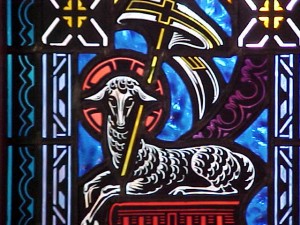To Be Led Out of Egypt
 This past year, I was privileged to celebrate a Passover seder with some close friends during Holy Week. It was both a reminder of the persistence of the faith of Judaism in its own right and of the roots for the new Passover that Jesus established, through his institution of the Eucharist, and through his Crucifixion and Resurrection. Remembering how God provided for his people Israel in their time of need presents to us some important reflections.
This past year, I was privileged to celebrate a Passover seder with some close friends during Holy Week. It was both a reminder of the persistence of the faith of Judaism in its own right and of the roots for the new Passover that Jesus established, through his institution of the Eucharist, and through his Crucifixion and Resurrection. Remembering how God provided for his people Israel in their time of need presents to us some important reflections.
The haggadah (the Jewish text that provides the order for the Passover seder) reminds us that in each generation, we are obligated to think of ourselves as if we have been brought out of Egypt. Clearly, this is not meant in a literal sense, as many Christians and Jews have never been out of the country, much less to Egypt. Rather, we are to remember that we each come from a place of struggle, through which God means to lead us.
When we recall the story of the Exodus, it is too easy to see Egypt as the main focus of the narrative action. While the afflictions of the Israelites in Egypt were indeed terrible and painful, and God meant to lead them out of the place of oppression itself, he did not intend them to escape the exterior slavery to the Egyptians merely to lapse into the interior slavery of sin under their own self-government.
In turn, we Christians must see ourselves as being lead out of Egypt: the Lord seeks to lead us away from the punishments of evil, but the Promised Land does not come easy. It often takes years of following the Lord faithfully through the desert.
The salvation of the resurrection does not come without the pain, the humiliation, and the sorrow of the cross. While we can see so clearly other people who do not like us, and seek to make life difficult, it is sometimes difficult for us to see how we, by our own sin and spite, bring ourselves only to dispersion by turning away from the faith of the living God.
The realism inherent in living a spiritual life as a Christian is made manifest in our acknowledging the struggle in our lives to stay faithful to the God who has made us and called us to himself. The danger of our time is the complacency that tells us that our days don’t matter much in the grand scheme of things.
This complacency can ultimately tend to despair, which whispers seductively that we ourselves are but merely the sum of our experiences, the count of our days, and that ultimately we are the ones who are worthless in this world. Rather, the God who has spoken us into being and pledged his Word to our salvation, reminds us that even as the few sparrows sold at the market for a tuppence are not forgotten by the Lord, we, who are worth more than many sparrows, will not be forsaken (Luke 12:6-7).
Not being forsaken does not mean that our lives won’t be difficult and challenging. What it does mean is that God will be with us throughout our journey as he was with the Israelites in the desert.
In their hunger, they were given manna to eat. As Catholics, we know that the Lord feeds us daily through his grace, which is presented through the sacraments of the Church. It is advisable for us, then, to seek the sacraments often – especially the body and blood of our Lord in the Sacrament of the Eucharist, the fulfillment of the seder, the commemoration of the passion of the final Passover lamb.
Jesus gave his life on the cross to lead his Church to salvation, and in the Eucharist he truly gives his flesh for the life of the world. Receiving Christ in the sacrament more frequently can lead us closer to him, as we pray and ask him to increase his love within us, to increase in us the theological and natural virtues, and to lead us away from our sinful ways.
What being lead out of the land of Egypt means, ultimately, is being lead by God away from our vices and the pains of captivity to sin. We know that as Israel’s Exodus was, ours too will be at times a story of infidelities to the Lord. But we must continue to seek Him in our hope, and pray that, in the words of the Act of Contrition, with the help of His grace, we may go and sin no more. In this, we share the path through the desert with our fellow Christians, as well as our Jewish brothers and sisters, who seek the face of the Lord, the thou of the personal God.
We must seek to support each other, to grow in virtue, to flee from vice, to advance in wisdom, and grace with God and men. This quest requires a constant rededication of our days to God, so that we may above all things love Him, and our neighbor as ourselves. Let us then, rid ourselves of complacency, and pray to God the words of Psalm 90: “teach us to number our days, that we may present to You a heart of wisdom” (Ps 90:12).

